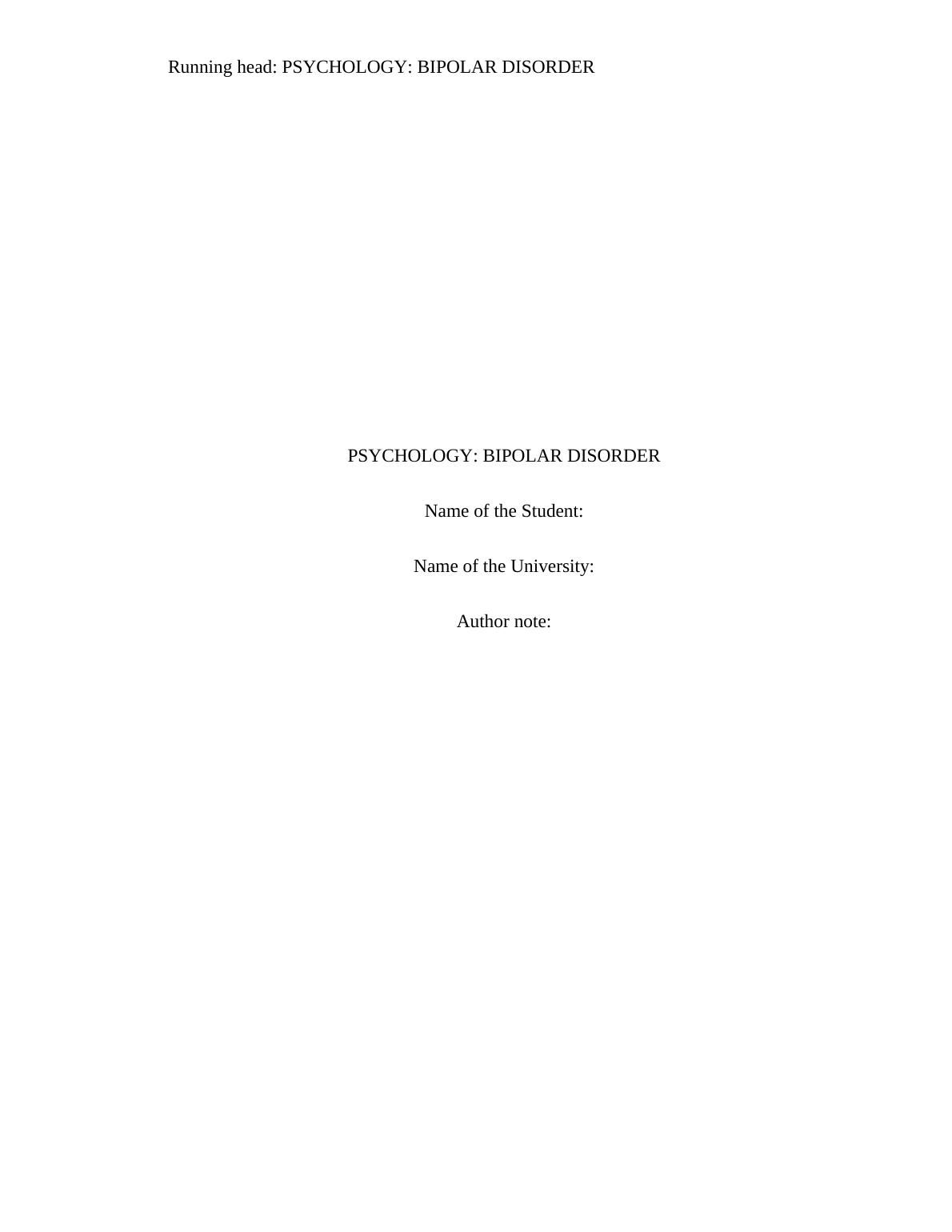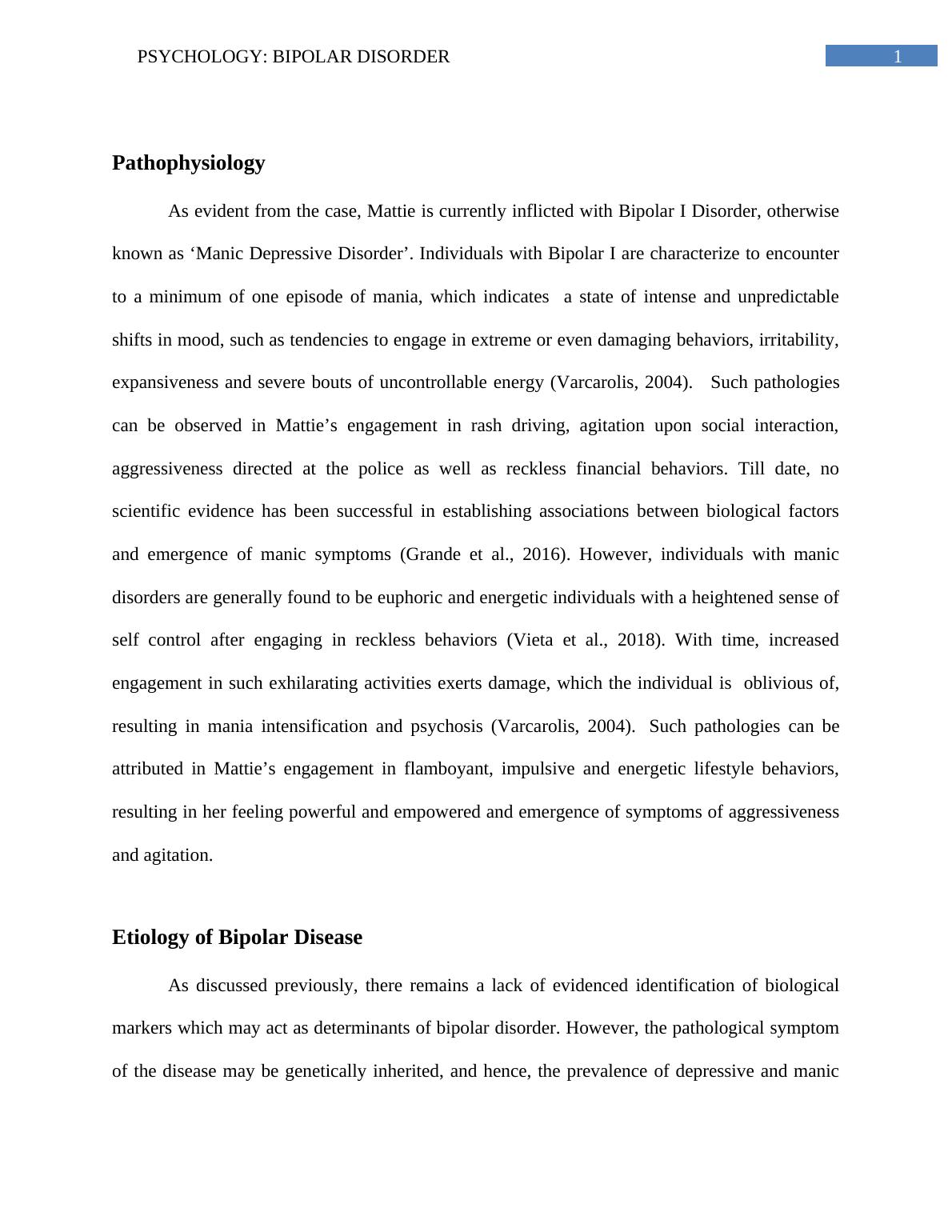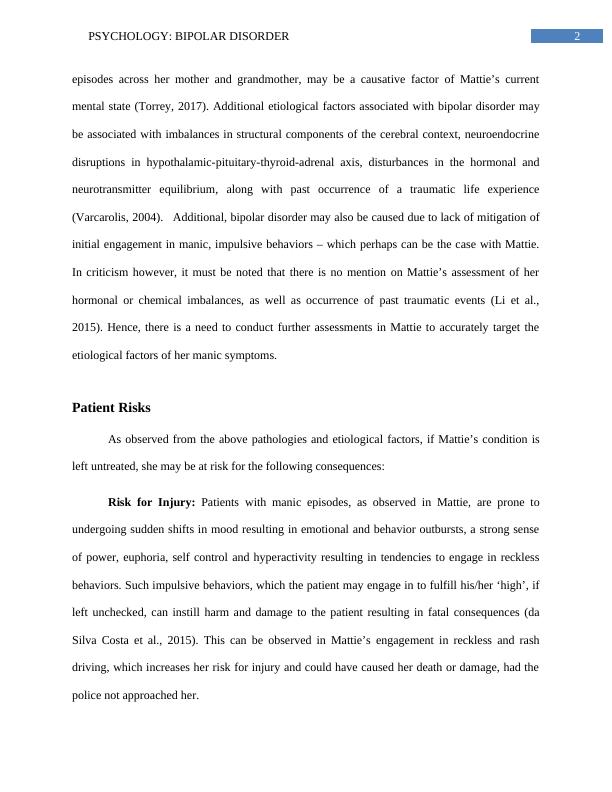Psychology: Bipolar Disorder
Added on 2023-03-30
8 Pages1520 Words405 Views
Running head: PSYCHOLOGY: BIPOLAR DISORDER
PSYCHOLOGY: BIPOLAR DISORDER
Name of the Student:
Name of the University:
Author note:
PSYCHOLOGY: BIPOLAR DISORDER
Name of the Student:
Name of the University:
Author note:

1PSYCHOLOGY: BIPOLAR DISORDER
Pathophysiology
As evident from the case, Mattie is currently inflicted with Bipolar I Disorder, otherwise
known as ‘Manic Depressive Disorder’. Individuals with Bipolar I are characterize to encounter
to a minimum of one episode of mania, which indicates a state of intense and unpredictable
shifts in mood, such as tendencies to engage in extreme or even damaging behaviors, irritability,
expansiveness and severe bouts of uncontrollable energy (Varcarolis, 2004). Such pathologies
can be observed in Mattie’s engagement in rash driving, agitation upon social interaction,
aggressiveness directed at the police as well as reckless financial behaviors. Till date, no
scientific evidence has been successful in establishing associations between biological factors
and emergence of manic symptoms (Grande et al., 2016). However, individuals with manic
disorders are generally found to be euphoric and energetic individuals with a heightened sense of
self control after engaging in reckless behaviors (Vieta et al., 2018). With time, increased
engagement in such exhilarating activities exerts damage, which the individual is oblivious of,
resulting in mania intensification and psychosis (Varcarolis, 2004). Such pathologies can be
attributed in Mattie’s engagement in flamboyant, impulsive and energetic lifestyle behaviors,
resulting in her feeling powerful and empowered and emergence of symptoms of aggressiveness
and agitation.
Etiology of Bipolar Disease
As discussed previously, there remains a lack of evidenced identification of biological
markers which may act as determinants of bipolar disorder. However, the pathological symptom
of the disease may be genetically inherited, and hence, the prevalence of depressive and manic
Pathophysiology
As evident from the case, Mattie is currently inflicted with Bipolar I Disorder, otherwise
known as ‘Manic Depressive Disorder’. Individuals with Bipolar I are characterize to encounter
to a minimum of one episode of mania, which indicates a state of intense and unpredictable
shifts in mood, such as tendencies to engage in extreme or even damaging behaviors, irritability,
expansiveness and severe bouts of uncontrollable energy (Varcarolis, 2004). Such pathologies
can be observed in Mattie’s engagement in rash driving, agitation upon social interaction,
aggressiveness directed at the police as well as reckless financial behaviors. Till date, no
scientific evidence has been successful in establishing associations between biological factors
and emergence of manic symptoms (Grande et al., 2016). However, individuals with manic
disorders are generally found to be euphoric and energetic individuals with a heightened sense of
self control after engaging in reckless behaviors (Vieta et al., 2018). With time, increased
engagement in such exhilarating activities exerts damage, which the individual is oblivious of,
resulting in mania intensification and psychosis (Varcarolis, 2004). Such pathologies can be
attributed in Mattie’s engagement in flamboyant, impulsive and energetic lifestyle behaviors,
resulting in her feeling powerful and empowered and emergence of symptoms of aggressiveness
and agitation.
Etiology of Bipolar Disease
As discussed previously, there remains a lack of evidenced identification of biological
markers which may act as determinants of bipolar disorder. However, the pathological symptom
of the disease may be genetically inherited, and hence, the prevalence of depressive and manic

2PSYCHOLOGY: BIPOLAR DISORDER
episodes across her mother and grandmother, may be a causative factor of Mattie’s current
mental state (Torrey, 2017). Additional etiological factors associated with bipolar disorder may
be associated with imbalances in structural components of the cerebral context, neuroendocrine
disruptions in hypothalamic-pituitary-thyroid-adrenal axis, disturbances in the hormonal and
neurotransmitter equilibrium, along with past occurrence of a traumatic life experience
(Varcarolis, 2004). Additional, bipolar disorder may also be caused due to lack of mitigation of
initial engagement in manic, impulsive behaviors – which perhaps can be the case with Mattie.
In criticism however, it must be noted that there is no mention on Mattie’s assessment of her
hormonal or chemical imbalances, as well as occurrence of past traumatic events (Li et al.,
2015). Hence, there is a need to conduct further assessments in Mattie to accurately target the
etiological factors of her manic symptoms.
Patient Risks
As observed from the above pathologies and etiological factors, if Mattie’s condition is
left untreated, she may be at risk for the following consequences:
Risk for Injury: Patients with manic episodes, as observed in Mattie, are prone to
undergoing sudden shifts in mood resulting in emotional and behavior outbursts, a strong sense
of power, euphoria, self control and hyperactivity resulting in tendencies to engage in reckless
behaviors. Such impulsive behaviors, which the patient may engage in to fulfill his/her ‘high’, if
left unchecked, can instill harm and damage to the patient resulting in fatal consequences (da
Silva Costa et al., 2015). This can be observed in Mattie’s engagement in reckless and rash
driving, which increases her risk for injury and could have caused her death or damage, had the
police not approached her.
episodes across her mother and grandmother, may be a causative factor of Mattie’s current
mental state (Torrey, 2017). Additional etiological factors associated with bipolar disorder may
be associated with imbalances in structural components of the cerebral context, neuroendocrine
disruptions in hypothalamic-pituitary-thyroid-adrenal axis, disturbances in the hormonal and
neurotransmitter equilibrium, along with past occurrence of a traumatic life experience
(Varcarolis, 2004). Additional, bipolar disorder may also be caused due to lack of mitigation of
initial engagement in manic, impulsive behaviors – which perhaps can be the case with Mattie.
In criticism however, it must be noted that there is no mention on Mattie’s assessment of her
hormonal or chemical imbalances, as well as occurrence of past traumatic events (Li et al.,
2015). Hence, there is a need to conduct further assessments in Mattie to accurately target the
etiological factors of her manic symptoms.
Patient Risks
As observed from the above pathologies and etiological factors, if Mattie’s condition is
left untreated, she may be at risk for the following consequences:
Risk for Injury: Patients with manic episodes, as observed in Mattie, are prone to
undergoing sudden shifts in mood resulting in emotional and behavior outbursts, a strong sense
of power, euphoria, self control and hyperactivity resulting in tendencies to engage in reckless
behaviors. Such impulsive behaviors, which the patient may engage in to fulfill his/her ‘high’, if
left unchecked, can instill harm and damage to the patient resulting in fatal consequences (da
Silva Costa et al., 2015). This can be observed in Mattie’s engagement in reckless and rash
driving, which increases her risk for injury and could have caused her death or damage, had the
police not approached her.

End of preview
Want to access all the pages? Upload your documents or become a member.
Related Documents
Nursing Care and Recovery Plan for Bipolar Affective Disorderlg...
|21
|3449
|109
